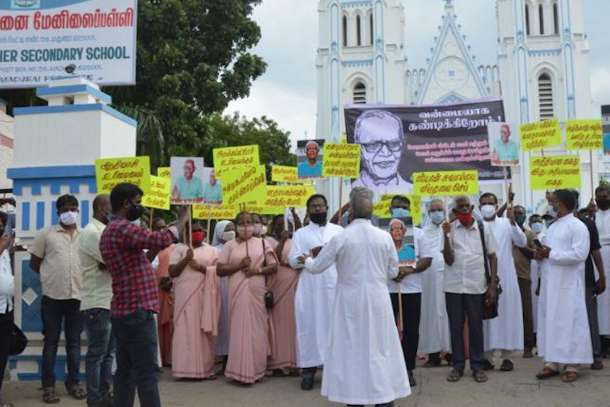Protests across India over Jesuit’s arrest on sedition charges
Protesters say the government misuses certain laws to harass and silence its critics
Updated: October 13, 2020

A priest addresses a gathering on Oct. 12 in Madurai town in Tamil Nadu state at a protest over the arrest of Jesuit Father Stan Swamy in Jharkhand state. Most districts in Tamil Nadu, the home state of Father Swamy, witnessed similar protests demanding his immediate release. (Photo supplied)
Protesters shouted slogans and carried placards in several Indian cities and towns seeking the immediate release of an octogenarian Jesuit tribal rights activist arrested last week on charges of having links with a banned Maoist group.
Rights activists, priests, nuns, and people from all walks of life demanded the release of Father Stan Swamy, who was arrested on Oct. 8 from his residence on the outskirts of Ranchi, the capital of eastern India’s Jharkhand state.
“Give voice to Father Stan, who gave a voice for the voiceless,” said a slogan on a placard that a young girl carried while joining a silent human chain in Bengaluru, the capital of the southern state of Karnataka, on Oct. 12.
Protesters called for the government intervention’s to release the sickly priest, who was remanded to 14 days of judicial custody until Oct. 23. The priest is quarantined in a hospital following the government’s Covid-19 protocols.
The 84-year-old priest is accused of having links with outlawed Maoist rebels and being party to a conspiracy that led to a violent clash in Bhima Koregaon in Maharashtra state on Jan. 1, 2018, in which one person was killed and many others wounded.
The National Investigation Agency, the federal agency probing terror-related activities, also arrested 15 other social and rights activists and sent them to judicial custody in the same case.
The priest is the latest person arrested in the case. Investigators claim those arrested have links to a banned terrorist group. They face several charges including sedition.
The priest has consistently claimed the charges were fabricated and viewed them as a means to silence his criticism of the government’s violation of tribal people’s basic rights as humans.
He also questioned the government for jailing more than 3,000 tribal youths who opposed the acquisition of tribal lands, branding them as members of a banned Maoist group.
The pro-Hindu Bharatiya Janata Party (BJP) was in power in Jharkhand until December 2019, when it was defeated in the state elections, helping a secular government led by a regional party come to power.
The NIA functions under the federal government run by a BJP-led coalition.
In Father Swamy’s home state of Tamil Nadu, people demonstrated before most district headquarters. Civil rights activists and political leaders from all political parties, barring the BJP, pledged their support for the jailed priest.
Father Swamy hails from Trichy, also known as Tiruchirappalli, in the southern state.
The protesters demanded the scrapping of the stringent Unlawful Activities Prevention Act, saying the government and investigating agencies are misusing it to target people like Father Swamy who have criticized the government while working for oppressed people.
“We are proud of Father Swamy and his stand for the oppressed tribal and other people in the country, especially in Jharkhand,” Father A. Santhanam, a Jesuit who coordinated the protests in Tamil Nadu, told UCA News on Oct. 13.
“We appreciate his commitment and courage in facing these troubles for the sake of standing with the causes of oppressed people. The government must be thinking that harassing those speaking for the oppressed can terrorize rights activists, but it only emboldens us to stand for the right cause.”
Archbishop Peter Machado of Bengaluru joined a 3-kilometer-long human chain complying with Covid-19 protocols in Karnataka state’s capital city.
“The priest must be released. The government should encourage him for the great service he has been doing for the poor and underprivileged instead of harassing him,” the prelate told media during the protest.
Medha Patkar, a prominent social activist who addressed a gathering in New Delhi through a Zoom meeting, said her heart beats for Father Swamy, who “worked for Atmanirbhar Adivasi [self-reliant tribal people].”
In Kerala, another southern state, the regional bishops’ forum said the priest’s arrest and jailing had shocked it.
The Church has always worked “for the development of the poor and the downtrodden … It is through hard-working, sincere and committed persons” like Father Swamy that the Church carried on this work, said the Kerala Catholic Bishops’ Council in a statement.
Several other bishops also issued statements pledging their support for Father Swamy and urging the government to release him immediately.




